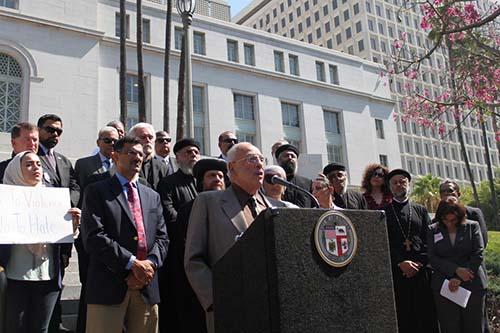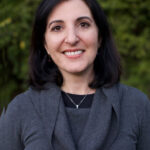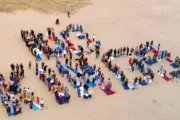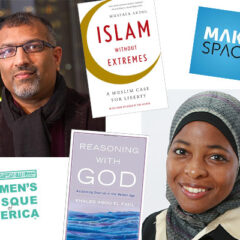In the past few weeks, two familiar voices have reemerged to explain the violence and rage that erupted in Libya, Egypt, and across the Muslim world earlier this month. Ayaan Hirsi Ali and Salman Rushdie, both household names, have well-known, harrowing stories of how they were individually terrorized in the name of Islam.
Ali’s recent Newsweek cover story, “Muslim Rage,” failed to offer us any insight into this newest wave of violence. Instead, it was a simple work of Islamophobia that played to our basest fears about Islam. The cover stereotypically depicted men with beards and white robes, looking, well, uncontrollably angry and rage-filled. The piece itself used broad brush strokes, relying on Ali’s personal narrative (as well as extensive references to Rushdie’s recently released biography), to blame the violence simply on the intolerant and intrinsically violent nature of Islam. “In the age of globalization and mass immigration, such intolerance has crossed borders and become the defining characteristic of Islam,” Ali writes. But, what was most troubling to me about her piece is an assertion that she makes within the first two paragraphs: “In 23 years not much has changed.”
In fact, a lot has changed across the Arab and Muslim world, even in the last two years. The revolutions in Egypt, Tunisia, Libya, and Yemen, and the ongoing revolutions in Syria and Bahrain, will change the Muslim world and Middle East forever. In the aftermath of the Arab Spring, populations around the region are struggling to figure out how to exercise freedoms they’ve never had before. In the past, mass expressions of outrage were frequently controlled by authoritarian regimes. In societies where police violently suppress undesirable speech, the “silent majority” never had to speak out. Moreover, many in the Middle East have a hard time understanding America’s freedom of speech laws and that inflammatory videos can be made without the tacit support or knowledge of our government.
Self-regulation of free speech only comes with practice. Over the next few years a battle will be waged—not between Islam and the West—but between the newly elected Islamist parties and the Salafis extremists on their right for the future direction of their societies. Progress will be slow and uneven. The mere fact that some revolutions succeeded in toppling dictators or that democratic elections were held will not erase the political void that has plagued the region for more than five decades.
And, on occasion, as evidenced in recent weeks, extremists may even have their day.
This does not mean that Ali is right about Islam and the Muslim world. By not backing away from her own personal narrative, Ali fails to put the violence in context, to tap into the real issues and debates facing a New Middle East, to offer a nuanced picture of the Muslim political spectrum across different countries, and maybe even to recognize the change and the small signs of hope that may have even emerged from this tragedy. (For example, the presence of a prominent pro-U.S. presence in the aftermath of the violence in Libya is heartening. Closer to home, Muslims used Twitter to both redefine and make fun of the Newsweek article by using the hashtag #MuslimRage.)
Ali is right to talk about a world of globalization and mass immigration. But it might also be useful to listen to others, such as journalist Doug Saunders, whose new book, The Myth of the Muslim Tide, directly challenges Ali’s argument.
We must consider the fact that the flow of ideas should move in both directions in this global age. Muslims in the free world, who have lived in democratic societies for decades, could help influence the tide abroad or be an example of the type of role that Islamic groups could play in a successful, democratic Middle East. In the last two weeks, the Muslim Public Affairs Council (MPAC) has held press conferences in Los Angeles—one to denounce the violence and another with the Los Angeles Diocese of the Coptic Orthodox Church to stand up to the bigotry and violence that threatens to consume their respective communities in Egypt. This week, MPAC also released messages of tolerance aimed at foreign audiences in Arabic and in Urdu using the example of the Prophet Muhammad to explain why such violence is wrong. Such a flow of ideas can only take root if we continue to engage the Muslim world and if we carefully reexamine our policies towards the region.
There is a narrative directly related to MPAC that may be useful to many who are struggling to understand the Muslim world. In 1989, when Muslim leaders across the world jumped on the fatwa bandwagon to condemn Salman Rushdie for The Satanic Verses, Maher Hathout, one of the founders of MPAC, went on local television to denounce the fatwa and defend Rushdie’s right to expression, even though he found the book highly offensive. At the time, he paid a high price for his statements—Hathout and his family faced death threats from the extremists within their own community and spent nights huddled in their living room, fearful of those who had vandalized their home and car.
For more than three decades, Hathout has promoted an Islam that is compatible with democratic ideals, even spearheading the need for an American-Muslim identity in the early 1980s. How have his moderate, progressive viewpoints developed? This is an important question that we may need to ask as we try to assess the future of the Middle East and our role in it. By listening to what Hathout had to say during a Friday prayer last week at the Islamic Center of Southern California, one would never know that nearly fifty years ago, when he was a young revolutionary in Egypt, he once led protests that railed against the United States. This may be a narrative worth listening to and learning from.
Photo Credit: Muslim Public Affairs Council
Rhonda Roumani is a contributing fellow with the USC Center for Religion and Civic Culture and a journalist fellow with the Spiritual Exemplars Project.








